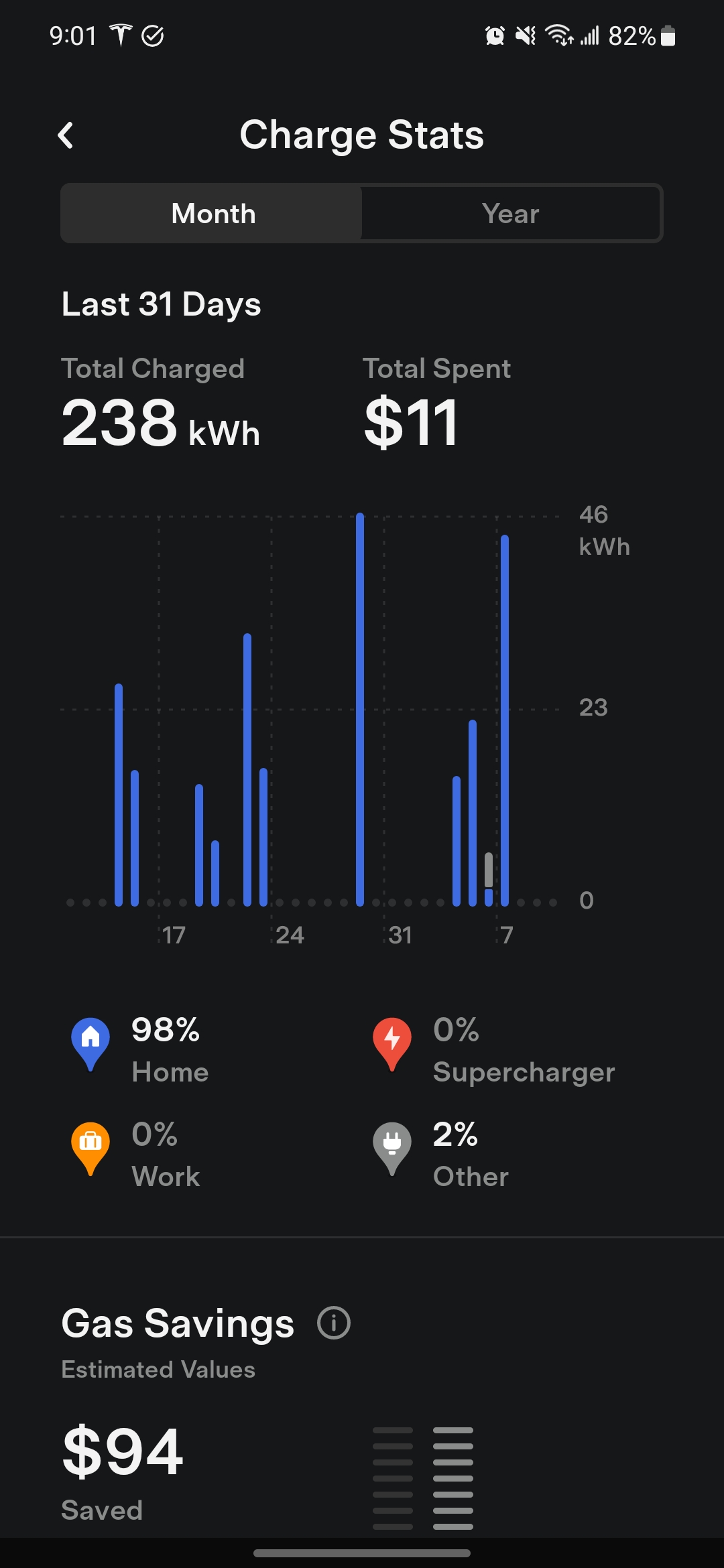- cross-posted to:
- evs@feddit.uk
- cross-posted to:
- evs@feddit.uk
Airbnb owner claims holiday makers running cables out the window is theft if electricity.
deleted by creator
Ahaha, what? She provides electricity as part of her services, for free. WTF is this person smoking?
Just to pay devil’s advocate for a moment - but let’s imagine the house has oil heating (heating oil is basically diesel). Ignoring the problems of unpaid duty, given that the heating oil is provided as part of the holiday home’s services, would it be theft if a guest filled up their diesel car from the heating oil tank? If that would be theft, why would (at least in the holiday home owner’s opinion) it be unreasonable to not treat charging an electric car off the house supply in the same way, as clearly just as the heating oil isn’t intended to be put in guests cars, the electricity isn’t, either?
That’s not the same, because fuel stations exist. You’re expected to refuel at a fuel station, which can also be done nearly instantly. You do not leave your car.
An electric car is expected to be charged at home. You can charge them at work, or during a pit stop, but you CANNOT leave them at public charging places, and public charging varies a ton depending on location.
If there was a close by public charge station with overnight charging, sure, but there’s not, and it’s unreasonable for someone to expect a visitor to come and not recharge their car.
Are they supposed to wake up in the morning, drive to a public charger, and then sit there for 2 hours in the morning? No. No one does that. They drive home and charge over night if they’re able to make it home.
There are quite a few public charging points in the UK
I used to live in a house which used real diesel for heating. It was in a different country though. But the thing was that we had a special diesel storage. Meaning that the amount of fuel was limited. If I’d rent you such a house, I would put only as much fuel as you need to keep you warm during your stay. If you refuel your car with it, then you’ll freeze to death at -30°. Your choice, mate, lol.
I get the safety concerns but does she say “no charging cars” in the terms and conditions. I am not sure this is theft any more than charging mobile phones and tablets would be. If she is worried about how much electricity then take meter readings and make it accepted terms that all electricity is to be paid for. What if one guest choses to use the oven for a five course meal. Is that theft of electricry
IMO the electric oven is an appliance of the house, can be used at your better convenience. But the consumption of your car, was it by fuel or by electricity by charging a 80 - 100 kWh car battery, should not be supported by the property owner.
And you are comparing a phone battery with a car battery, I get that on paper it looks like that same but obviously this is messed up comparison. Sounds like comparing filling water for pasta cooking and filling a 40k L swimming pool…
In the end, the answer will be that renting prices will increase to support the extra electricity cost. And those not having an electric car will pay more for nothing more.
I get it’s different, but is it theft. If there was a wattmeter and I filled an inflatable swimming pools every day would that be theft… What if I brought an inflatable hot tub and ran the heater for the week. If electricity is included in the rate that implies the guest can use what they want
Better not charge your phone or laptop either then 🙄
A smartphone battery is about 4,000mAh a Tesla Model 3 is about 62kWh
One thing is not like another
Yeah you’re comparing Amps to Watts, apples to oranges
You’re absolutely right. I’ll let you do the maths
A smartphone battery is usually operating at around 3.7V, so a 4500mAh cell would give you about 17Wh.
4Ah at 5 volts is 20 watt hours, or 1/3100th of a Tesla battery.
It’s exactly the same except larger, unless you think the car is somehow pulling more than the house can give, which isn’t how that works like, at all.
It’s about £19 to completely recharge the Tesla. A fraction of a penny to recharge the phone. It’s polite to ask
The size is exactly what matters. I think we can all agree that filling up a 5,000 gallon water tank with tap water from a vacation home isn’t acceptable use.
So the only question is at what point becomes the use too much. A single car might seem harmless but what if it’s a group of 4 all arriving with their own car, charging it at the home.
Clarifying what’s acceptable and what isn’t, is the right decision.
Oh no, oh no, it’s a few pence worth of electricity. Screeching noises THIEF!! HOW DARE YOU USE THE INCLUDED UTILITIES
According to my quick calculations- my current home tariff is 31p per kilowatt hour
A Tesla model 3 has a 62kWh - so about £19 to recharge. If I’m staying there a couple of weeks and intend to drive heavily that would mount up. I’d definitely check with the house owner as a courtesy
Air conditioning is usually 55 kWh per day. Electric furnaces are 25 kWh per day. Going to check with them before you use that too?
Air conditioning isn’t generally used in the UK, and no way would it take 55kWh a day to bring one of our houses a few degrees down. Most UK households use less than 10kWh a day total.
There’s absolutely no way that this home owner in North Wales would have aircon.
But use of a built in appliance is not the same as running a cable out to power something that is likely to double the household’s normal usage. Just ask.
Speaking to the Mirror, Amanda said: “It’s not just the cost – it’s also about safety. Charging a battery using a three-pin plug can take around 30 hours.
“That’s a significant amount of power flowing through a standard household socket for an extended period of time.”
You have circuit breakers specifically if it’s using too much power.
Don’t you have 240v mains power in the UK? Trying to charge a car off 120v only adds 3 miles of range per hour in the US so I had to have a dedicated circuit installed. It might be the same in the UK for amperage reasons. What’s a three pin plug?
A three pin plug is just the UK standard plug, it has three pins on it, with the top pin being longer than the other two which engages firsts and prevents electrocution. They are also fused instead of the actual wall socket.
AFAIK (and i could be totally wrong here; 3 phase is where my knowledge of electricity takes a sharp dip!) you can get up to 480V total on a 3 phase circuit in the US… 3 phase is what a lot of dedicated car charging circuits would run off
i had heard that US properties get 3 phase power by default and a lot of your circuits are split between the phases, where a lot of 230/240V countries get a single phase, and that you have certain 240V circuits for speciality things like clothes driers that operate somehow using multiple phases at once? or that could be total nonsense misremembering
… but also, houses in 240V countries (i’m in australia for example and we have 240) can also get 3 phase, and that’s often what’s added for electric vehicles
You can get 3-phase in the UK, but it’s very much down to what’s available in the street.
And you’re definitely getting into commercial pricing for the install when you call the electric company.
Most of the time, home chargers are just up-rated cables from a standard single-phase supply (most houses are 100A or 60A, so 30A for a car isn’t insane, while giving 7.2KWh)
While this is true, extended high current usage through a 3 pin plug isn’t ideal - especially if the house wiring is a bit old and imperfect (and the breaker won’t trip until imperfect old wiring breaks down). It’s generally not recommended to regularly charge cars off standard 3 pin plugs, although a one off usage will probably be just fine.
Yeah circuit breakers are there to protect the cables in the wall. Only the newer ones protect you and the cables.
I’ve not read the article because I refuse to give the Express any attention. They’re only very slightly better than the Daily Mail, and that’s only because their reach isn’t as great. This article will almost certainly be coming from the perspective of “new things bad, old things good, so we’ll sow a feeling of distrust in our aging readers”, and I have no time for that shit.
But to answer the question; no, of course it isn’t, unless, as /u/Hogger85 has said, the AirBnB owner has specifically banned EV charging. If they haven’t, then it should be considered part of the cost of doing business and accounted for the same way they would any other energy usage.
and if they have banned EV charging they should realise nobody is going to honour that rule anyway and stop being such a dick, suck it up, and get on with running their airbnb like a normal person that doesn’t care about a few of £ of electricity per mo
At least in that situation they might win a court case on it.
Oh no! It takes 30 hours to charge the car, it must be dangerous! Lol it takes 30 hours because it’s charging at a safe rate
I leave the ceiling fan on all the time so I guess I’m paying tens of thousands
deleted by creator
Then she should get a proper charging point put in she can monitor and bill, it’s not like the shift to electric cars had snuck up on people.
It’s not theft unless the owner specified in the conditions of the rental that car’s couldn’t be charged at the property. (Even then “Theft” is a strong word!)
That being said - there is obviously a big difference in charging your phone and charging a car and really we are at a point where this should be clear in all holiday rental agreements one way or another.
I don’t think the owner would be happy if someone just turned on all the taps in the house and left them running for the entirety of their stay. There is a sort of “fair use” which is assumed (if not actually in writing)
Question comes if car charging should always be assumed “fair use” or is that above and beyond? Or is it a gray area that just “depends”… Much better for everyone if all this is made as clear as possible in the agreement right at the beginning.
I’m sure the courts would agree it’s not theft, but it really is taking the piss: a typical UK home uses on the order of 10kWh per day - and an electric car can easily take 60kWh to charge. This isn’t like charging a mobile phone which is basically noise - it can mean someone staying for 5 days can easily end up using twice what the reasonable expectation for electricity use was.
Having said that, if I were the owner of a holiday home, I’d probably install a proper electric car charger as a selling point and I’m sure it would be possible to set the daily rate for the property to cover the cost of charging a car.
Turning all the taps and leaving them running actually cost more…
deleted by creator
I’m not sure it is theft. But I’d certainly ask the owner before doing it as an act of politeness
Airbnb is theft too.
Property is theft comrade
deleted by creator
It’s more than 30p / kwh.
A 32 amp fuse allows around 7.5kw, not 3kw
House plugs in the UK typically have a 13 amp fuse, not 16 amp.
It’s not a safety issue. The wiring to the socket should support 32 amp, with a safety margin on top.
half awake sorry! my mistake.
as long as the wiring is recently checked its ok but many UK properties are not safe at all for this sort of load.
that’s literally what the fuses and breakers are for
In theory yes. If you’ve ever stayed in a bed and breakfast on the Isle of Wight for example, you wouldn’t trust those fuses as far you can throw them and absolutely don’t want a £20k lithium battery car plugged into what is essentially world war 2 wiring. Your breaker will just expire and leave the rest to burn away
world war 2 wiring kinda isn’t the issue… if the wires can handle 5a they should have a 5a breaker… the only problem with old wiring is the insulation could be done for and then it’s an issue of arcing which will cause a fire whether there’s something plugged into the socket or not!
electrical fires and safety here is not an issue unless the house isn’t up to code… so either they’re using it as a poor excuse, or they’re admitting that their house is unsafe under any circumstances
… or, possibly just as likely considering they’re concerned about “30hr” of charging: they’re just ignorant
Yes, I’m sure we agree on that. My point is, loads of houses are not up to code. Garden plug outlets for mowing the lawn are not be used for charging a car in the same way that old extension leads are not
garden plug outlets should have an appropriate breaker on them for whatever they’re rated at… you can use them for whatever you like: they’re no different from an inside plug other than being weather proofed… why would they be any different? old extension leads are also fine for charging a car, as long as the insulation is fine and they’re rated the same as the breaker… again, why would they not be? its not like extension lead technology has exactly changed much: it’s a chunk of copper surrounded by non-conductive material
it doesn’t become a fire risk simply because it’s old…
NEWS BREAK: Landlord gets slightly less money in the mail one month.
What is that, like the equivalent of 2 euros on the electric bill?
No, I would say 1kWh being 30-50p and the car battery, say, 50-100kWh, maths would end up being between 0.3*50=15 and 0.5*100=50. Not insurmountable, but definitely not nothing.
Are you saying it is something between £15 and £50?
At £50 l, that’s more than my wife’s car is to fill up, and would let it run for 400 miles or so. Are those numbers accurate because that’s wild that electricity costs as much as petrol.
Recharging a Tesla 3 at home comes to just under £30 by my calculations
Dang electricity must be expensive AF over there. Where I’m at in the US I pay $0.04/kWh (super off peak) and can fill up 0-100% (75kw) like 3 times for only $11 (£8.61)

It is very expensive here at the moment. Wholesale electricity prices went though the roof last winter, largely due to Western Europe’s erliance on Russian gas
deleted by creator
Electricity at home hasn’t been 7p/kwh for decades. 30p is a low estimate.
googles for numbers
https://energyguide.org.uk/average-cost-electricity-kwh-uk/
Area Average variable unit price in 2021 (p/kWh) April – September 2022 Estimate for January 2023 East Midlands 18.4 26.3 31.9 Eastern 18.8 27.8 33.8 London 18.9 28.2 34.2 Merseyside & North Wales 20.2 28.2 34.2 Northern 18.4 25.8 31.3 North Scotland 19.3 26.6 32.3 North West 18.4 26.7 32.4 South East 19.5 26.5 32.2 South Scotland 18.8 26.5 32.2 South Wales 19.5 26.9 32.7 South West 19.5 27.1 32.9 Southern 18.8 27.1 32.9 Midlands 18.6 26.5 32.2 Yorkshire 18.2 26.1 31.7 United Kingdom (including VAT) 18.9 28 34 7.5p/kwh overnight with an EV tariff on octopus. Even non-EV tariff night rates are like 17p/kwh.
And it’s very unlikely that this home owner is on that tariff
yes sorry, i was half awake!
I’m looking at my Tesla app right now in the charging section and I average about 15 dollars a month of electricity, at 14c a kw/h.
So somewhere around 0.50 cents a day in added cost. This landlord is just being fussy and fearful of the “new”.
Like people back in the day thinking light switches could shock you dead for flipping them.
*I looked it up for the area specifically and their electricity is up to 40 cents equivalent dollars a kilowatt hour, so it could be up to 3.50 or so bucks a day if it’s charging non stop. Electricity is expensive over there and I stand corrected.
This is a UK sub, and unfortunately our electricity is not that cheap at the moment. A current quote from Octopus energy:
Tariff cost breakdown ⚡ ElectricityDaily standing charge 47.95p /day Unit rate 30.3p /kWh
Holy shit.
Yeah, I don’t understand why conservatives are against energy independence.
🤷♂️
Meh, charge more then. Electricity utilization is typically included with vacation rentals.













